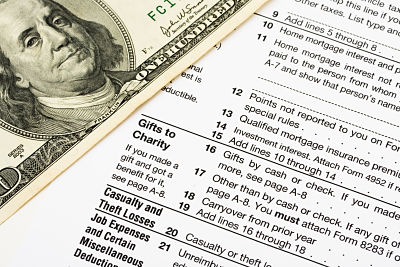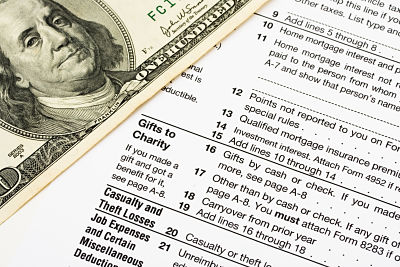by Anina DeTommaso
Like it or not, tax preparation should be a year-round endeavor. To maximize your deductions for charitable giving at tax time, be sure you document your donations as you make them all year long. If you have been wondering about the best way to organize your records for your tax preparer, here are some helpful hints.
First, it is important to remember that there are two different kinds of donations: cash donations and non-cash donations. For cash donations, it is important to have and keep the receipts or bank statements for your records. Your tax preparer, however, usually will need only the dollar amount of the contribution. There is a limit on how much one can donate, but that limit is surprisingly high. In general, you can deduct contributions up to 30-50% of your adjusted gross income.
Below is a list of organizations where you can make a charitable donation:
- Churches and other religious organizations
- Tax-exempt educational organizations
- Tax-exempt hospitals and some medical research organizations
- A government unit, for example, a state or a political subdivision of a state
- Publicly supported organizations
- Private foundations that give all of the contributions they receive to public charities within 2 ½ months after the end of the foundation’s fiscal year
- A private operating fund that pools all donations in a common fund
- Certain membership organizations that rely on general public for more than a third of their contributions
 You can verify which organizations are charitable by referencing the IRS Exempt Organizations Select Check website or the Charity Navigator website.
You can verify which organizations are charitable by referencing the IRS Exempt Organizations Select Check website or the Charity Navigator website.
The value of a donation is typically dollar-per-dollar, unless the charitable organization values it otherwise. If you received goods or services, you will be able to deduct only the amount that exceeds the value of the goods received. For instance, if you attend a charity dinner and pay $250, the amount for the dinner itself is not deductible. The charity typically will provide you with a letter stating the correct amount you may deduct.
Generally speaking, your tax preparer may not request receipts for non-cash charitable donations totaling less than $500. You will need, however, to keep detailed receipts for your records. If the total value of your donation exceeds $500, there are certain items that your tax preparer will need in order to claim the charitable contribution on your tax return:
- The receipt
- The date of the donation
- The address of the charitable organization
- The fair market value of the item donated
Here are other important points to remember when organizing your records for items you have donated:
- Keep a list of items you are donating along with the receipt
- Make sure to document the condition of the items donated
- If you are not sure how to value the item, a good rule of thumb is to see how much the organization you are donating it will sell it for
- If donating food items, keep the receipt from the store where the items were purchased and be sure to get written acknowledgment of the donation
- Consider taking pictures of items donated (particularly high-value donations)
For non-cash donations, what you paid for the item is not what you would list as the value of the item. For example, if you bought a fur coat for $10,000, you will need to find out what the organization that you are donating the fur to will charge for it. It may be only $1000. If the fur is priced for re-sale at $1000, that is the amount you would declare for the coat you donated. Turbo Tax offers a tool called ItsDeductible, which can help you value and track your charitable donations. The link is: https://itsdeductibleonline.intuit.com/Logout.htm.
You would want to list the value of the items you donate as the fair market value, or the amount for which the organization is going to sell the item. Items donated must be in good condition or better. If you are donating an item that is valued at more than $5,000, you must have a written appraisal of the fair market value of the item.
You may not claim the value of volunteering your services as a charitable donation on your tax return. The IRS does not allow deductions for the value of an individual’s time. It is also important to remember that while there are many contributions that are charitable donations, there are some contributions that are not considered charitable including:
- Political parties, campaigns, or political action committees
- Gifts donated to individuals
- Contributions to labor unions, chambers of commerce or business associations
- Contributions to for-profit schools and hospitals
- Contributions to foreign governments
So avoid the stress of tax preparation season with a bit of tax planning. Remember to document and keep records of everything that you donate throughout the year. Being organized and having the proper documentation are key to making tax time less taxing on you.
This article was re-posted on October 4, 2017 at Forbes.com click here to read it again.
Anina DeTommaso is a Paraplanner in the Chicago office of The Planning Center, a fee-only financial planning and wealth management firm.
Email her at: anina@theplanningcenter.com.








